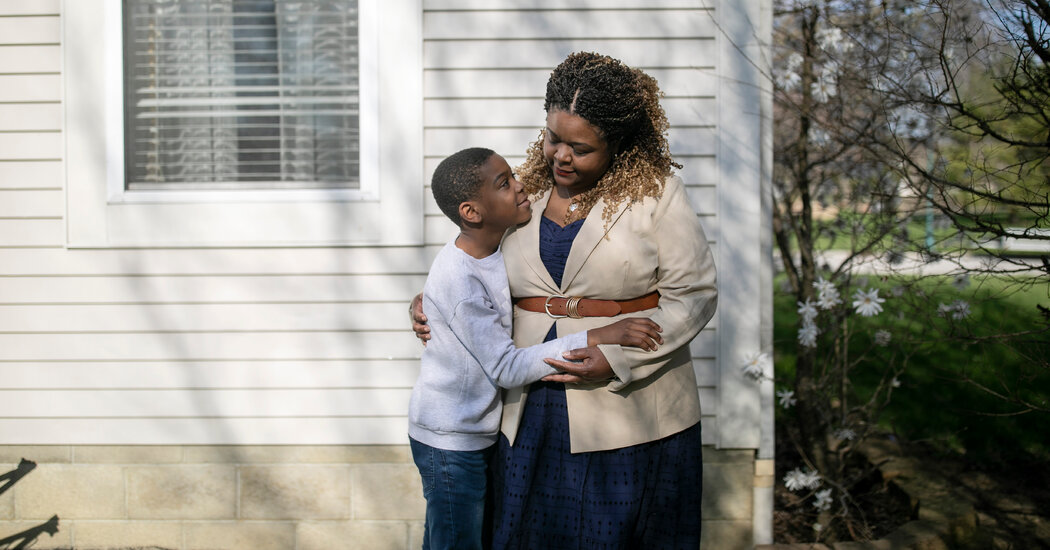When Afrika Gupton-Jones was on bed rest in the hospital, after developing high blood pressure at 28 weeks of pregnancy, her husband was with her day and night. Yet the nurses often assumed that he was her brother, and that she was a single mother. When the doctors and nurses gave her medications or took her blood, she said, they gave her minimal explanation.
“It’s like they didn’t trust me with my own bodily decisions,” she said.
In the United States, people who have more money generally receive better health care: More expensive insurance plans usually cover more doctors, and well-off patients can afford the increasingly high out-of-pocket costs that come with medical care. But despite being upper-middle-class and privately insured, Ms. Gupton-Jones and her husband felt they were treated insensitively. Her career in marketing didn’t make a difference in how doctors and nurses saw them, she said, nor did his doctoral degree.
Earning more and being well educated generally doesn’t protect Black mothers during childbirth the same way it protects white mothers. A new study of a decade of births in California, published this year, found that the richest Black mothers and their babies were twice as likely to die from childbirth as the richest white mothers and their babies.
Missing from mortality statistics are the many stories of mistreatment and negative experiences. In interviews with Black women who responded to a request from The New York Times to share their birth stories, they described having their pain dismissed, concerns ignored and plans disregarded while giving birth. They recalled walking a fine line between speaking up for themselves but feeling nervous to push too hard.
Numerous studies suggest that racism, and how it affects Black women’s health throughout their lives, is a primary driver. It starts long before women become pregnant, researchers say. It happens across health care settings, with research showing that even if medical staff is empathetic overall, just one such interaction can have a big effect. It continues through childbirth, when discrimination, unconscious or not, affects Black mothers’ hospital care.
“These long-term issues of disparities in maternal outcomes can’t be boiled down to class,” said Tyan Parker Dominguez, who studies race and birth outcomes at the University of Southern California School of Social Work. “Racism doesn’t operate along economic lines, because even when you control for that, it’s still a factor.”
Ms. Gupton-Jones’s son Sidney, now 8, was born at 30 weeks, and stayed in the neonatal intensive care unit for six weeks. It was filled with families of color, she said, while the health care professionals at the suburban Ohio hospital were white. They took good care of Sidney, she said, but she and her husband felt they were treated dismissively.
Though she was comfortable advocating for herself in her career, she said, she and her husband said nothing at the hospital, because they didn’t want to create conflict with the people taking care of Sidney. “You had to have a blind trust in the overnight shift that they were taking care of your child appropriately,” she said, “so you didn’t want to rock the boat.”
‘Racism doesn’t operate along economic lines’
Studies show that high levels of income and education generally lead to better birth outcomes, like lower rates of C-sections, preterm births and infant mortality — except when the mother is Black.
One reason is that many Black women with more resources probably ascended into their class recently, said Professor Parker Dominguez. Her research has found that the resources that women had growing up have a greater effect on their reproductive health than the socioeconomic status they’ve achieved as adults.
“They’re likely to have lived in disadvantage, which doesn’t get undone just because you reach 30 years old and you’re reaching $100,000 in income,” she said.
There is also evidence, in her work and that of others, that experiencing racism has long-term effects on health. It can increase incidences of underlying conditions like hypertension and diabetes, and affect birth outcomes. These effects can be passed down through generations.
“It’s been maybe a generation or two since we’ve had opportunities for African Americans to move en masse into the middle class,” Professor Parker Dominguez said.
Studies find that Black women who plan to deliver without an epidural are more likely to be pressured into using one. C-section rates are lower for white women with advanced degrees, but not for highly educated Black or Hispanic women. When Black women have C-sections, they are twice as likely as white women to receive general anesthesia, which makes them unconscious for their child’s birth.
New mothers who are Black are significantly more likely to be tested for drugs than white mothers, even though white mothers are more likely to test positive, a new study conducted in Pennsylvania found.
Black women are more likely to be reported to child welfare services after giving birth. In qualitative studies, they have described health care workers who have assumed they are single or have multiple children or low incomes, whether or not those things are true.
“Regardless of socioeconomic status, when a Black mother or birthing person presents to a health care system, they are starting out being up against racial stereotypes,” said Jaime Slaughter-Acey, an epidemiologist at the University of Minnesota who studies racism in health care.
In pain, but afraid to speak up
Lia Gardley, 32, had hoped to deliver her son, Jaxson, without an epidural. A construction manager, she thought that if she could make it past seven centimeters dilation, the point at which she had learned the pain peaks, she could make it all the way. Her repeated requests to the nurse to check how far she was dilated, though, were denied.
“She kept saying, ‘No, if you’re having so much trouble, you should just get the epidural,’” Ms. Gardley said.
Exhausted, and unsure how much labor she had left, she agreed to the epidural. Shortly after, a nurse checked her dilation, only to find she’d already made it past seven centimeters.
“It still bothers me when I think about it, because I had such intention and determination, and all I had needed them to do was give me all the information so I could make my informed decision,” Ms. Gardley said.
Others described being subject to stereotypes. One woman said a pediatrician assumed her baby was on Medicaid. Another described a nurse referring to her domestic partner, now husband, as a “baby daddy.” A third was accused of inappropriately seeking opioids when she repeatedly returned to the hospital after delivery because she was experiencing intense headaches and dangerously high blood pressure.
“The nurse said, ‘What is it you want? This is your third time here, what do you want, Dilaudid?’” a mother and physician in Maryland said. “I just said, ‘No thank you, I guess it’s time for me to go,’ and I didn’t go back, because clearly the nurse thought I was drug seeking. And that didn’t feel good at all.”
The physician, who did not want to use her name because of her professional connections in health care, said she and her husband decided not to have another child, in large part because of her experience after the delivery.
“I think that historically, Black people’s pain has been dismissed and under-treated,” she said. “There are all these myths. I don’t know that there’s anything sinister — just like with many things with racism and disparities in health care, a lot of it is unconscious, and your own assumptions clouding your judgment.”
Many Black mothers described walking a tightrope: wanting to make providers aware of their knowledge or even their expertise as health care workers themselves, but also to avoid being labeled difficult.
Sade Meeks worked in a neonatal intensive care unit while she was pregnant with her daughter Leilani in November 2020, two months before her due date. Ms. Meeks had a difficult, emergency C-section; she recalled fading in and out of consciousness while she was wheeled into the operating room. She was surprised and concerned when the hospital said she was ready for discharge just three days later.
“I could barely stand,” she said. “I was in so much pain but I didn’t want to make a scene. If I started yelling or making demands, I know I’d be labeled the ‘angry Black woman.’ They said things to me like, ‘You’re a woman, you’re strong, other women have been through worse.’”
In her NICU work, Ms. Meeks had seen how the hospital was more likely to involve child welfare services with Black families, a trend that holds true nationwide. She feared that pushing back too hard could have that consequence, so she reluctantly went home.
But the next day, still in terrible pain, Ms. Meeks went to another hospital’s emergency room and was diagnosed with a serious infection. She was admitted, and spent weeks there recovering while her daughter was across town in another hospital’s NICU. She tried shipping breast milk to Leilani, but the logistics proved impossible.
“It was traumatic, and I felt like I’d failed not only myself but my child,” Ms. Meeks said. “I wish I’d been more assertive with my concerns, but they kept brushing them off.”
‘We can’t change what we don’t name’
Dr. Donna Adams-Pickett, a practicing obstetrician in Georgia, said she treats all her Black patients’ pregnancies as high-risk ones because of the well-documented poor outcomes.
“There are often excuses for our complaints and our concerns, which are consistently minimized,” she said. “I find myself often having to serve more as an advocate than as a physician.”
Even her presence as a Black physician may help protect her patients: Studies find that Black newborns delivered by Black doctors have better outcomes.
But she also finds that bias extends to her as a Black female obstetrician. Dr. Adams-Pickett, who has practiced for decades and delivers hundreds of babies annually, described instances in which white doctors involved in deliveries dismissed her expertise. Once, she said, another doctor questioned her order for an emergency C-section, and she had to point to the fetal tracing monitor and show him the blood between the patient’s legs to convince him.
“It bothered me that I had to go through all these steps, and lose valuable time, to prove to him that my patient needed emergent surgery,” she said.
The women in these stories survived and so did their babies, so for most of them, their negative experiences were not categorized as poor outcomes. Yet to combat racism in hospital care, said Dr. Karen A. Scott, an obstetrician, it has to be tracked. At her organization, Birthing Cultural Rigor, she developed a survey to measure racism during childbirth.
It asks patients about mistreatment, and concerns like whether mothers felt they had open communication with and empathy from health care providers, and how their partners or others were treated at the hospital. It surfaces issues, like Black husbands who are policed in hospital hallways, that would not otherwise be noted.
“When we just look at outcomes, we minimize what hurts Black birthing people,” she said. “We can’t change what we don’t name, what we don’t measure and monitor.”




